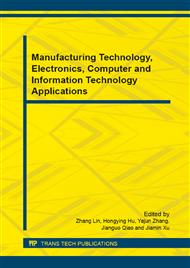p.3787
p.3791
p.3794
p.3801
p.3806
p.3809
p.3812
p.3818
p.3822
The Research to the De-Noising Method for the Vibration Signals Based on EEMD
Abstract:
Dynamical properties of mechanical systems can be obtained with the vibration signals from the systems. However, for the influence of noises, it is difficult to accurately acquire the features. Therefore, de-noising operation is significant for vibration signal in the practical engineering. In order to resolve this problem, the Ensemble Empirical Mode Decomposition (EEMD) method is introduced to try to eliminate noises from the analyzed signal. At first, the theory of the method is illustrated, which included adding white noises, EMD for the signal and calculating the mean of the intrinsic mode function. On this base, the signal which contains several harmonic components with white noise is processed by EEMD. As the result shown, the random noise can be effectively removed; moreover, the harmonic components can be accurately separated. And these improve that the EEMD is an effective method for the de-noising.
Info:
Periodical:
Pages:
3806-3808
Citation:
Online since:
November 2014
Authors:
Keywords:
Price:
Сopyright:
© 2014 Trans Tech Publications Ltd. All Rights Reserved
Share:
Citation:


